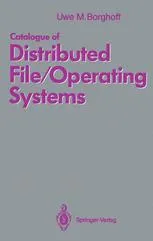Catalogue of Distributed File/Operating Systems
5.0
Reviews from our users

You Can Ask your questions from this book's AI after Login
Each download or ask from book AI costs 2 points. To earn more free points, please visit the Points Guide Page and complete some valuable actions.
In general, distributed systems can be classified into Distributed File Systems (DFS) and Distributed Operating Systems (DOS). The survey which follows distinguishes be tween DFS approaches in Chapters 2-3, and DOS approaches in Chapters 4-5. Within DFS and DOS, I further distinguish "traditional" and object-oriented approaches. A traditional approach is one where processes are the active components in the systems and where the name space is hierarchically organized. In a centralized environment, UNIX would be a good example of a traditional approach. On the other hand, an object-oriented approach deals with objects in which all information is encapsulated. Some systems of importance do not fit into the DFS/DOS classification. I call these systems "closely related" and put them into Chapter 6. Chapter 7 contains a table of comparison. This table gives a lucid overview summarizing the information provided and allowing for quick access. The last chapter is added for the sake of completeness. It contains very brief descriptions of other related systems. These systems are of minor interest or do not provide transparency at all. Sometimes I had to assign a system to this chapter simply for lack of adequate information about it.
Free Direct Download
Get Free Access to Download this and other Thousands of Books (Join Now)

